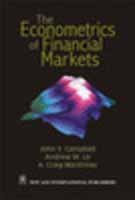Items related to The Econometrics of Financial Markets

The past twenty years have seen an extraordinary growth in the use of quantitative methods in financial markets. Finance professionals now routinely use sophisticated statistical techniques in portfolio management, proprietary trading, risk management, financial consulting, and securities regulation. This graduate-level textbook is intended for PhD students, advanced MBA students, and industry professionals interested in the econometrics of financial modeling. The book covers the entire spectrum of empirical finance, including: the predictability of asset returns, tests of the Random Walk Hypothesis, the microstructure of securities markets, event analysis, the Capital Asset Pricing Model and the Arbitrage Pricing Theory, the term structure of interest rates, dynamic models of economic equilibrium, and nonlinear financial models such as ARCH, neural networks, statistical fractals, and chaos theory.
Each chapter develops statistical techniques within the context of a particular financial application. This exciting new text contains a unique and accessible combination of theory and practice, bringing state-of-the-art statistical techniques to the forefront of financial applications. Each chapter also includes a discussion of recent empirical evidence, for example, the rejection of the Random Walk Hypothesis, as well as problems designed to help readers incorporate what they have read into their own applications
"synopsis" may belong to another edition of this title.
Winner of the 1997 Paul A. Samuelson Award, TIAA-CREF
"The definitive work explaining this complex but important field of academic endeavor. Oh, and by the way, it's not just academic. The big question that financial econometircs addresses is: What can you learn about the future from the financial data available from the past? This broad issue can be specified in many different ways, and all the important ones are discussed in the book. . . . The vast literature on all the topics examined is assessed, rendered coherent, and then analysed by three men who themselves have made significant advances in the field."--Ruben Lee, London Financial Market
"This book is sophisticated, yet accessible; full of details, yet intriguing. . . . Instructors will appreciate the attempt to make each chapter as self contained as possible which leaves them free to choose specified sequences of topics. Professionals will be pleased with the quick and authoritative introductions to important areas of Finance. . . . [A] well written introduction (indeed, something more) to Financial Econometrics. It is alert, explicit and articulate about assumptions. . . a splendid offering. . . . "--Maurizio Tiso, Review of Financial Studies
"Written by the "A" team of financial empiricism, it is a long awaited book. It covers many topics one could only usually find couched in the technical jargon of research papers, presented in this volume with pedagogical intentions. The language, while remaining technical, is quite accessible. It can be effortlessly read by scientific traders with standard knowledge of statistical methods. . . . This book should be made mandatory reading in research departments." --Derivative Strategies
"About this title" may belong to another edition of this title.
- PublisherNew Age International Pvt Ltd Publishers
- Publication date2007
- ISBN 10 8122421695
- ISBN 13 9788122421699
- BindingPaperback
- Number of pages632
- Rating
(No Available Copies)
Search Books: Create a WantIf you know the book but cannot find it on AbeBooks, we can automatically search for it on your behalf as new inventory is added. If it is added to AbeBooks by one of our member booksellers, we will notify you!
Create a Want